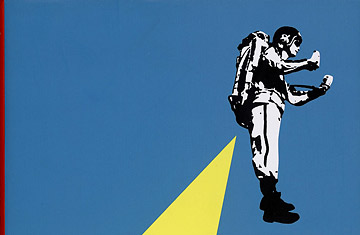
JetPack Dreams by Mac Montandon
Jetpack Dreams: One Man's Up and Down (But Mostly Down) Search for the Greatest Invention That Never Was
By Mac Montandon
Da Capo Press; 261 pages
The Gist:
When freelance writer Mac Montandon was growing up, he explains at the outset of Jetpack Dreams, he saw the turn of the millennium as a distant future full of awesome toys. "In that glorious future," he writes, "we would have long ago traded in our dirt-streaked Hyundais...at the very least, we'd have hovercrafts and flying cars. But really, the future meant jetpacks." Now that the future has arrived, he asks a simple question: "Where's my 'f-----g jetpack?' The device captured imaginations in movies like Thunderball and The Rocketeer, but attempts to harness its potential have long since sputtered. Still, if Montandon's query intrigues you, buckle up. Armed with lively prose and voluminous research on an invention that never flowered as promised, he takes readers on a tour of the jetpack's strange history and stranger modern subculture.
Highlight Reel:
1.Montandon traces the jetpack's history with gusto, and he's evocative when explaining the invention's allure. "The individual desire to fly—not as a group in the frustrating, frightening settlement of an airplane but as a comic-book hero might, as a machine of one—is an essential aspect of human consciousness," he writes. That may not ring true with everyone, but he sells the sentiment on the strength of his enthusiasm. He describes Harold Graham's 112-foot practice flight with a 140-pound Rocket Belt in 1961 as a "pilot kicking gravity's ass like it had never been kicked before." Defying God's wishes, it turns out, isn't an easy task. The world's best jetpack pilot, Bill Suitor, likened flying the contraption to "standing on a beach ball bobbing in the middle of a swimming pool." But Suitor mastered the technique, and during the opening ceremonies of the 1984 Olympics in Los Angeles, he cemented his place atop jetpack history: "He swooped out over the field, half-bird, half-man. So many cameras clicked at once that it felt like an unnatural bolt of lightning."
2. The middle-aged men who keep the flame of jetpack obsession alight are a quirky, entertaining bunch, united by their "heart-wrenchingly beautiful dream" to fly "like a twisted bird, for a wingless, breathless twenty-two second orgasm in the air." Montandon paints funny, faintly sad portraits of this group. "These are the anonymous, doughy faces of obsession," he writes. Among them is Jeremy McGrane, a 32-year-old New Hampshire resident who built his own "beautifully sleek, blue-corseted rocket belt," and who speaks candidly about the all-consuming nature of his pursuit: "Most guys are dreaming of alcohol and women," he tells Montandon. "Not me. I'm just dreaming about how to make a throttle valve. It's peculiar behavior, I'll admit it, but sometimes I can't sleep at night."
3. These flights of fancy don't just have the power to make men spend countless hours tinkering with a technology that hasn't improved much in decades. They've also spurred some twisted behavior. In a vivid, detailed account of the "blood-soaked disaster" that was the American Rocketbelt Corporation, Montandon reveals the underbelly of this single-minded quest. Brawls and lawsuits over "Pretty Bird" — a "cherry red" belt whose "silver tanks shone so brightly you could comb your hair in their reflection" — spiral into a sordid tale of murder, kidnapping and torture. After being sentenced to life imprisonment, one of the perpetrators, Larry Stanley — "paunchy, graying, defeated, and washed-up at fifty-seven" — tallies the price of his dream: "My search for the rocket belt has cost me more than half a million dollars and left my family destitute and on food stamps."
The Lowdown:
Montandon locates the origins of his project in the urge to quash the creeping feeling that, despite the successes of his career, he's yet to do anything exceptional. "I wanted my Moby Dick," he writes. Readers can get behind that feeling, and as a witty and likable writer, he makes a good companion for this quixotic journey. But it's a far cry from chasing white whales, even if both stories explore the pursuit of elusive goals. "How did a fairly useless device hold such power over their imaginations?" Montandon wonders of his subjects. For his purposes, the more pertinent question is whether a full-length meditation into an invention that never really materialized will pack enough gas to satisfy readers who don't spend weekends re-watching The Rocketeer.
The Verdict: Skim
